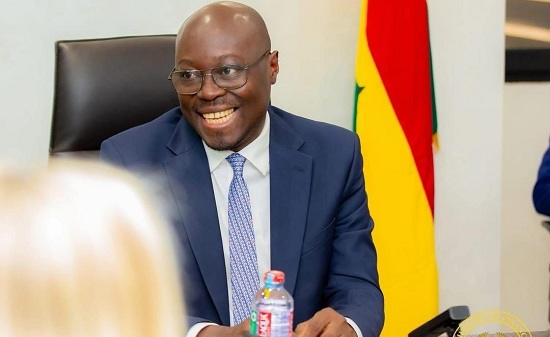Ghana’s Finance Minister, Dr. Cassiel Ato Forson, is leading the country’s delegation to the 2025 IMF and World Bank Spring Meetings.
This is the first such participation under the new National Democratic Congress (NDC) administration led by President John Dramani Mahama.The meetings come just one week after Ghana secured a staff-level agreement with the International Monetary Fund on the fourth review of its IMF-supported programme.
This agreement is expected to lead to the release of approximately 370 million dollars in support of Ghana’s economic recovery agenda. What makes the deal particularly noteworthy is that it was reached despite the fact that several structural benchmarks and quantitative targets under the programme had been missed before the new administration took office.
The agreement reflects renewed international confidence in Ghana’s direction, largely driven by the swift and targeted actions taken by the new government.
The Mahama-led administration has worked tirelessly to reverse the country’s fiscal challenges. In many cases, it has fast-tracked the implementation of key structural reforms while introducing additional corrective measures aimed at restoring macroeconomic stability and credibility.
One of the most urgent issues addressed has been the large buildup of payables in 2024, which created a significant primary deficit—far exceeding the modest surplus that had been programmed. The government has responded with a bold and pragmatic reform package to curb arrears, reinforce spending discipline, and strengthen Ghana’s public financial
Key measures implemented include:
• Commissioning a comprehensive audit of outstanding payables and commitments, to verify their legitimacy and recommend corrective actions. This audit is expected to be completed within eight weeks.
• Amending the Procurement Act to make the Finance Minister’s commitment authorisation a requirement before any central government procurement can proceed.
• Reforming the PFM Act to establish a binding debt rule targeting a 45% debt-to-GDP ratio by 2035, and a fiscal rule requiring an annual primary surplus of at least 1.5% of GDP. The reform also provides for the establishment of an Independent Fiscal Council.
• Operationalising a Compliance Desk at the Ministry of Finance to monitor how MDAs are adhering to fiscal rules.
• Launching a PFM Commitment Control Compliance League Table that will rank MDAs based on their level of compliance with spending controls and financial discipline.
In addition to these, the government has completed several structural reforms that were originally scheduled for completion by the end of December 2024 and March 2025—demonstrating its determination to stay ahead of schedule in resetting the economy.
Strategic Engagements in Washington
Throughout the week, Dr. Forson and the Ghanaian delegation are scheduled to participate in a series of high-level meetings and discussions. These include engagements with global leaders focused on key areas such as job creation, energy access, food security, and climate resilience.A major highlight of the week will be a meeting between Dr. Forson and IMF Managing Director Kristalina Georgieva, where Ghana’s progress, challenges, and reform agenda will be discussed in detail. Additional engagements are also planned with members of the Paris Club, rating agencies, the U.S. Treasury, and other development partners, all aimed at deepening collaboration and strengthening investor confidence.
Ghana’s Reset Story
In all his engagements, Dr. Forson is expected to tell what he calls “Ghana’s reset story”—a vision grounded in restoring and sustaining macroeconomic stability, ensuring debt sustainability, and laying the foundation for stronger and more inclusive growth. This reset includes protecting the poor and vulnerable, building resilience through ambitious structural reforms, and steering the country toward the broader goal of achieving “The Ghana We Want.”
management system.





